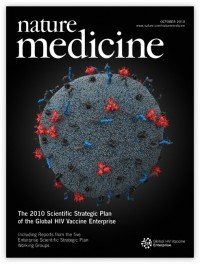Nature Medicine Q1 Unclaimed
Nature Medicine is a monthly journal publishing original peer-reviewed research in all areas of medicine on the basis of its originality, timeliness, interdisciplinary interest and impact on improving human health. Nature Medicine also publishes commissioned content, including News, Reviews and Perspectives, aimed at contextualizing the latest advances in translational and clinical research to reach a wide audience of M.D. and Ph.D. readers. It has an SJR impact factor of 18,333.
Nature Medicine focuses its scope in these topics and keywords: cell, cells, t, receptor, autoimmune, correction, dna, drug, cancer, chromosome, ...
Type: Journal
Type of Copyright:
Languages: English
Open Access Policy: Open Choice
Type of publications:
Publication frecuency: Monthly


9500 €
Inmediate OANPD
Embargoed OA0 €
Non OAMetrics
18,333
SJR Impact factor653
H Index680
Total Docs (Last Year)1495
Total Docs (3 years)20216
Total Refs35907
Total Cites (3 years)830
Citable Docs (3 years)22.55
Cites/Doc (2 years)29.73
Ref/DocOther journals with similar parameters
MMWR. Morbidity and mortality weekly report Q1
Annual Review of Public Health Q1
Annual Review of Clinical Psychology Q1
Journal of Thoracic Oncology Q1
Lancet Digital Health, The Q1
Compare this journals
Aims and Scope
Best articles by citations
The biology of VEGF and its receptors
Angiogenesis in cancer, vascular, rheumatoid and other disease
Human acute myeloid leukemia is organized as a hierarchy that originates from a primitive hematopoietic cell
Neurogenesis in the adult human hippocampus
Specific recruitment of regulatory T cells in ovarian carcinoma fosters immune privilege and predicts reduced survival
The fat-derived hormone adiponectin reverses insulin resistance associated with both lipoatrophy and obesity
Microenvironmental regulation of tumor progression and metastasis
Tissue microarrays for high-throughput molecular profiling of tumor specimens
Adiponectin stimulates glucose utilization and fatty-acid oxidation by activating AMP-activated protein kinase
Cancer genes and the pathways they control
Effects of a selective inhibitor of the Abl tyrosine kinase on the growth of Bcr–Abl positive cells
Leptin levels in human and rodent: Measurement of plasma leptin and ob RNA in obese and weight-reduced subjects
Tumor-associated B7-H1 promotes T-cell apoptosis: A potential mechanism of immune evasion
Microbial translocation is a cause of systemic immune activation in chronic HIV infection
A novel anti-apoptosis gene, survivin, expressed in cancer and lymphoma
Intestinal microbiota metabolism of l-carnitine, a nutrient in red meat, promotes atherosclerosis
Antibacterial resistance worldwide: causes, challenges and responses
Production of infectious hepatitis C virus in tissue culture from a cloned viral genome
Cancer immunotherapy: moving beyond current vaccines
The proximal origin of SARS-CoV-2
Angiogenesis inhibitors revised and revived at AACR
View more
Comments